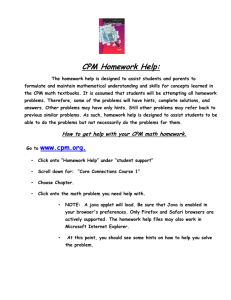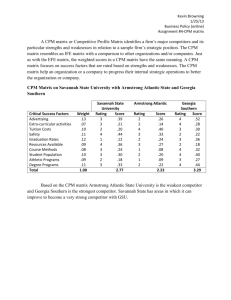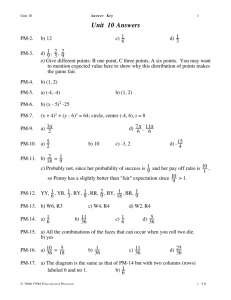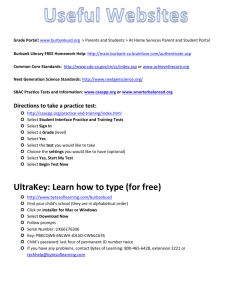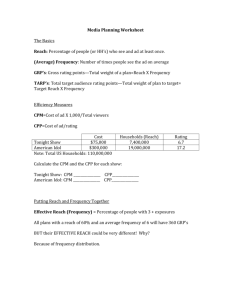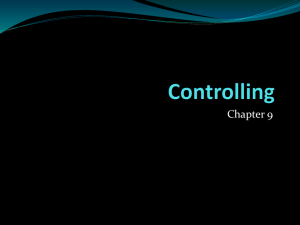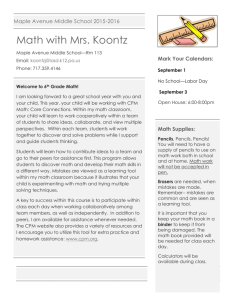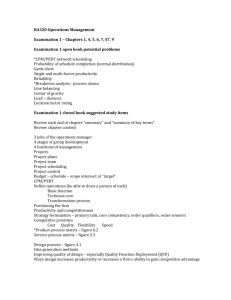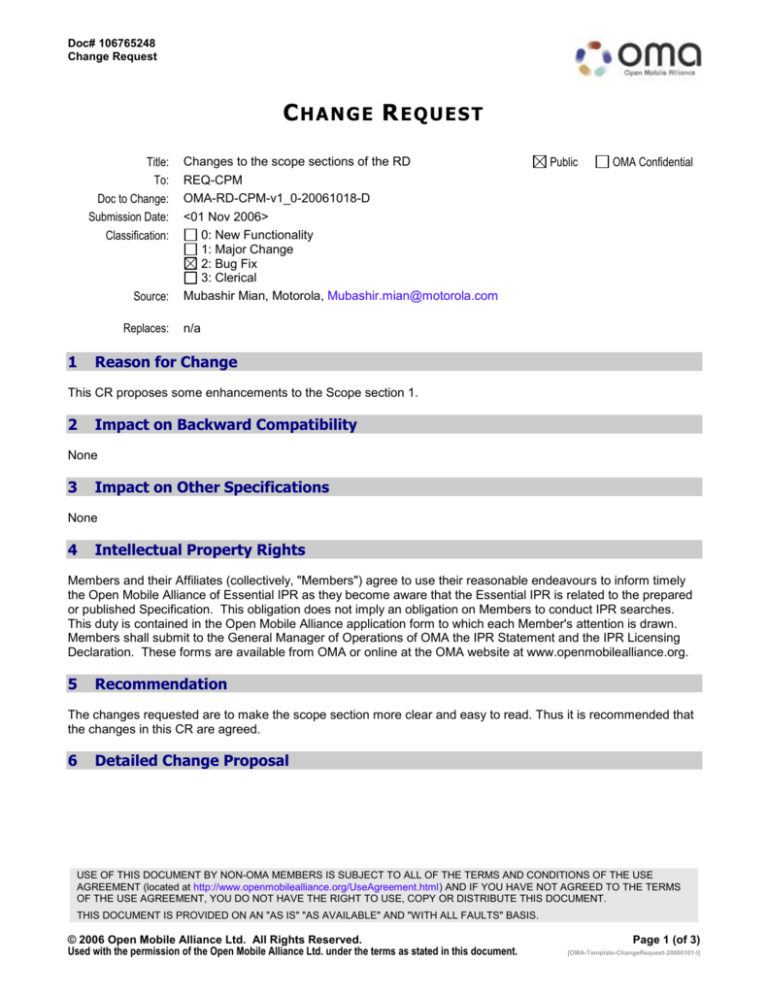
Doc# 106765248
Change Request
CHANGE REQUEST
Title:
To:
Doc to Change:
Submission Date:
Classification:
Source:
Replaces:
1
Changes to the scope sections of the RD
REQ-CPM
OMA-RD-CPM-v1_0-20061018-D
<01 Nov 2006>
0: New Functionality
1: Major Change
2: Bug Fix
3: Clerical
Mubashir Mian, Motorola, Mubashir.mian@motorola.com
Public
OMA Confidential
n/a
Reason for Change
This CR proposes some enhancements to the Scope section 1.
2
Impact on Backward Compatibility
None
3
Impact on Other Specifications
None
4
Intellectual Property Rights
Members and their Affiliates (collectively, "Members") agree to use their reasonable endeavours to inform timely
the Open Mobile Alliance of Essential IPR as they become aware that the Essential IPR is related to the prepared
or published Specification. This obligation does not imply an obligation on Members to conduct IPR searches.
This duty is contained in the Open Mobile Alliance application form to which each Member's attention is drawn.
Members shall submit to the General Manager of Operations of OMA the IPR Statement and the IPR Licensing
Declaration. These forms are available from OMA or online at the OMA website at www.openmobilealliance.org.
5
Recommendation
The changes requested are to make the scope section more clear and easy to read. Thus it is recommended that
the changes in this CR are agreed.
6
Detailed Change Proposal
USE OF THIS DOCUMENT BY NON-OMA MEMBERS IS SUBJECT TO ALL OF THE TERMS AND CONDITIONS OF THE USE
AGREEMENT (located at http://www.openmobilealliance.org/UseAgreement.html) AND IF YOU HAVE NOT AGREED TO THE TERMS
OF THE USE AGREEMENT, YOU DO NOT HAVE THE RIGHT TO USE, COPY OR DISTRIBUTE THIS DOCUMENT.
THIS DOCUMENT IS PROVIDED ON AN "AS IS" "AS AVAILABLE" AND "WITH ALL FAULTS" BASIS.
© 2006 Open Mobile Alliance Ltd. All Rights Reserved.
Used with the permission of the Open Mobile Alliance Ltd. under the terms as stated in this document.
Page 1 (of 3)
[OMA-Template-ChangeRequest-20060101-I]
Doc# 106765248
Change Request
1. Scope
(Informative)
This document defines the requirements for the Converged IP Messaging (CPM) enabler.
CPM targets to specify the future messaging functionalities as common reusable service capabilities that support the creation
of a range of IP-based services needing messaging functionality. The evolutionary interoperability between future IP-based
messaging services and legacy Mobile Messaging Services (e.g. SMS, MMS) is included in the CPM service concept in order
to achieve maximum connectivity between end-users (independent of whether they are using the future IP-based messaging
services or legacy Mobile Messaging Services).
Considering today’s diverse user experiences in various service domains, the CPM enabler should be provided across many
service domains for all IP networks (mobile, home, internet worlds) by addressing the service constraints in a bearer-agnostic
manner. A CPM service is intended to operate invisibly in the background. One of the essential features for a successful
service take off is the interoperability between different service providers (including roaming conditions) and the interworking
with existing legacy services. As the CPM enabler aims to provide a converged technology for various messaging services
today, common charging principles are essential for service success and transparency for user, whereby legacy interworking
may have different charging principles.
CPM enabler V1.0 is targeted to provide a converged messaging capability focussing on the user experiences provided with
the following services:
- Text messaging enabled services. SMS, IMPS, SIMPLE IM, Email, MMS
- Voice-enabled services: PoC, VoIP
- Video-o-IP
The scope of the requirements for the CPM enabler V1.0 has been defined to address the following features:
1.
User Addressing and Multi-device environment (N:M scenario): CPM enabler supports the following addressing
scenarios:
o
Single device with multiple addresses
o
Multiple devices with a single address
o
Multiple devices with multiple addresses
o
Support for receiving different media types over different devices on a per user basis
o
The above scenarios can be realized with a single or multiple access points. User preferences are a way to
provide for address/device/access point selection. The user‘s capability for device selection in conversation
can be controlled via user preferences.
o
2.
Conversation Handling: The CPM enabler supports the following conversation requirements:
o
Immediate as well as deferred messaging (with temporary server storage of conversation and subsequent
forwarding; with Mailbox storage, notification, and subsequent retrieval).
o
1-1, 1-N, and 1-application conversation with the selection of any kind of media (from single to multiple).
o
Add or remove media at any time during a conversation.
o
Start a conversation by sending a media
o
Change of user’s device during a CPM conversation without disrupting the conversation
o
© 2006 Open Mobile Alliance Ltd. All Rights Reserved.
Used with the permission of the Open Mobile Alliance Ltd. under the terms as stated in this document.
Page 2 (of 3)
[OMA-Template-ChangeRequest-20060101-I]
Doc# 106765248
Change Request
3.
Presence Support: The CPM enabler provides a flexible interaction with the presence enabler. While CPM has to
provide the needed support for Presence, the invocation of the service itself does not require the presence service of
necessity, and does not mandate an always-on condition for the CPM users
4.
Media support: CPM supports discrete (text, images, video clip, voice clip, binary file: files) and continuous
(streaming) media. Those media can be used for conversation invocation and to be added during conversation.
5.
Group Communication and Management: CPM group conversation supports the capability to be invoked for predefined and adhoc groups, and can be modified during conversations. The CPM enabler includes interworking with
the existing XDM enabler for various group management tasks like updating groups.
6.
Interworking with legacy services / other systems: To allow for efficient interworking with other systems, the
CPM V1.0 enabler needs to define the interface on the CPM enabler side to allow for the implementation of
interworking functions with legacy services and other systems. Note: this work shall not require changes to the
legacy/other systems .
7.
Network-based storage: The CPM enabler supports the following Network based storage functionality:
o
Storage of User’s contact list
o
Storage of Media
o
Storage of Conversations and media related to conversations
o
Storage of History for single messages and conversations (stored with contact, time, messages, shared
media to allow filtering of histories to user‘s views).
o
Synchronization of contacts, media, conversations
o
This storage capability is considered to be controlled by user preferences and SP policies
o
8.
Application support (ANI): The use of the CPM enabler for 3rd party applications is supported by a generalized
ANI interface.
© 2006 Open Mobile Alliance Ltd. All Rights Reserved.
Used with the permission of the Open Mobile Alliance Ltd. under the terms as stated in this document.
Page 3 (of 3)
[OMA-Template-ChangeRequest-20060101-I]

